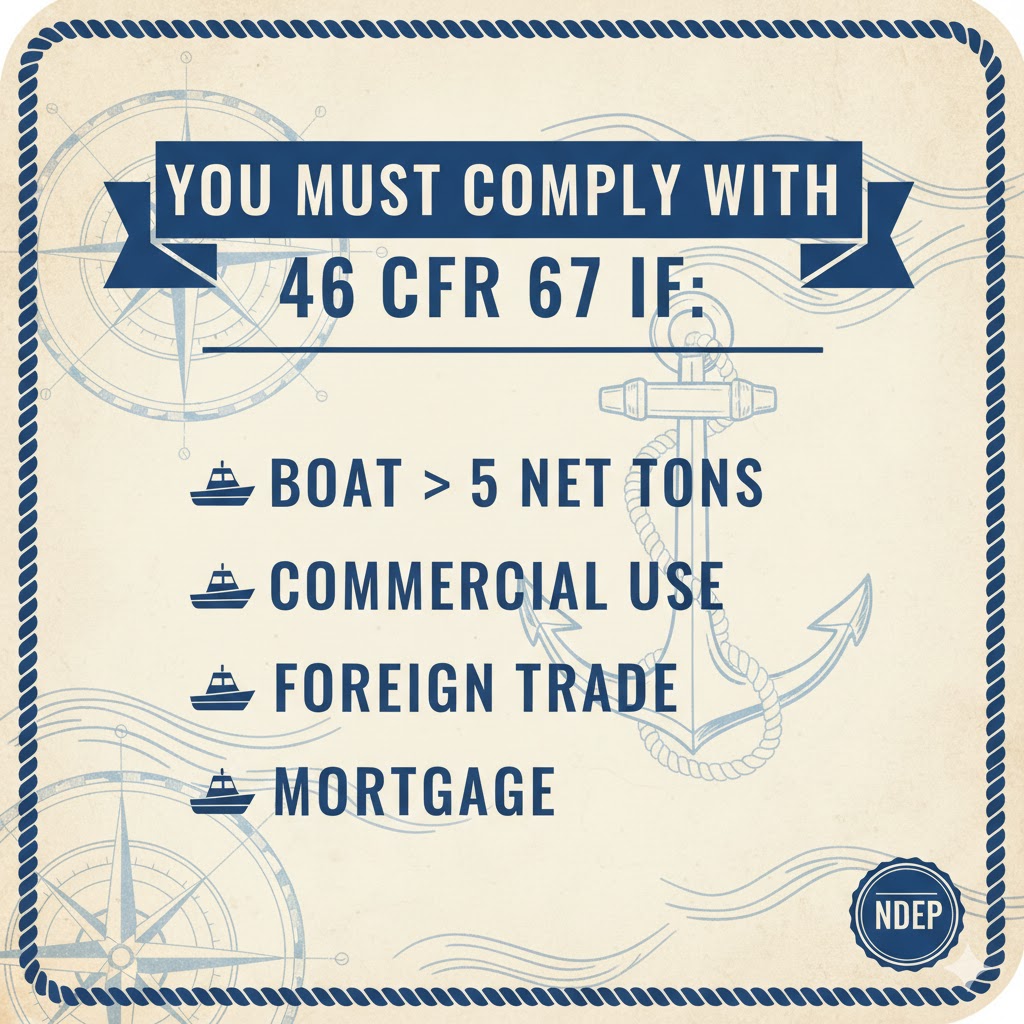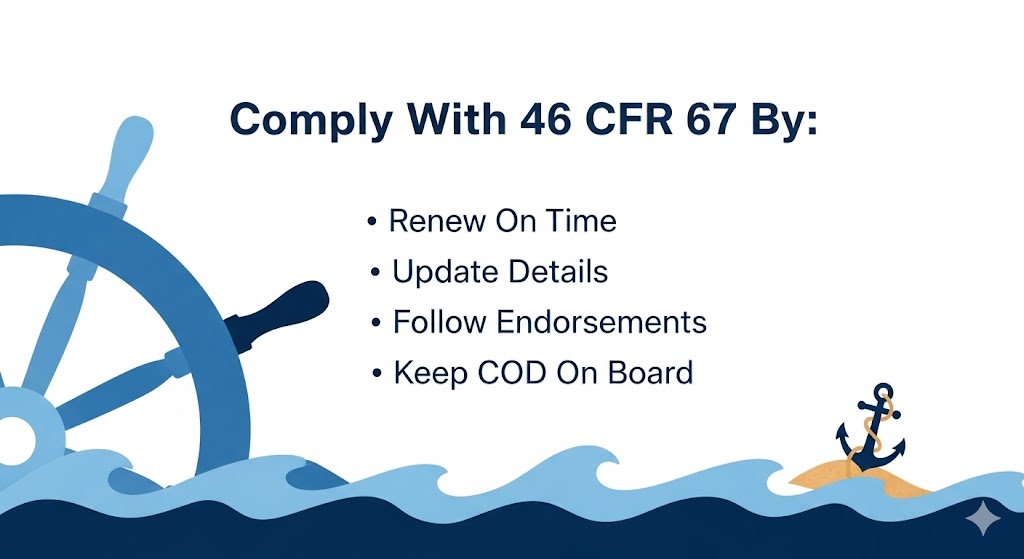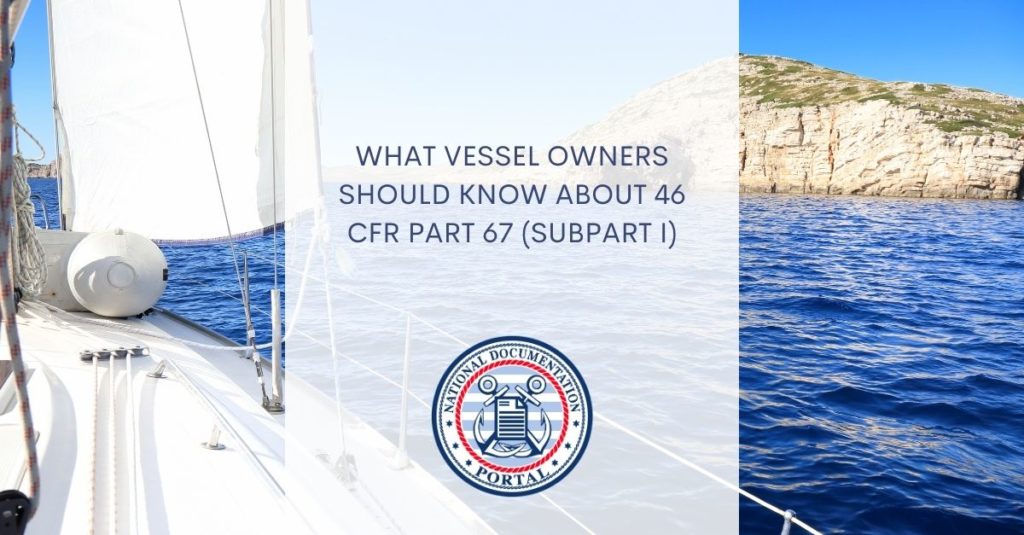Federal regulation 46 CFR 67 governs vessel documentation with the United States Coast Guard. It defines who must document a vessel, how documentation should be maintained, and what penalties apply when owners fail to comply.

46 CFR 67 also determines whether your vessel must be documented with the Coast Guard or if state registration will suffice.
At the National Documentation E-Portal, our online platform simplifies the process. That way, you can apply for Coast Guard documentation more efficiently and correctly.
What 46 CFR 67 Means for Vessel Owners
The regulation known as 46 CFR 67 is part of Title 46 of the Code of Federal Regulations, Chapter I, Subchapter G, Part 67.
It outlines:
- The vessels that must be documented with the Coast Guard.
- The requirements for initial documentation, renewal, and transfer of ownership.
- The penalties for non-compliance.
- The process for surrendering documentation.
This section of federal law applies to both commercial and recreational vessels that meet specific criteria. To put it simply, it serves as the foundation for vessel documentation standards throughout the United States.
46 CFR 67 and Coast Guard Documentation
Under this, certain vessels are required to have Coast Guard documentation. Documentation provides national registration and serves as evidence of nationality. This is essential for vessels that engage in:
- Coastwise trade
- Fishing operations in U.S. waters
- Offshore operations under federal endorsement
Recreational vessels over five net tons may also choose to document their vessels voluntarily. Always remember: the term “net tons” refers to volume, not weight.

Who Must Comply with 46 CFR 67?
The regulation determines who must apply for Coast Guard documentation. For example, you must comply if:
- Your boat measures five net tons or more.
- You plan to use your vessel for commercial purposes.
- You intend to operate your vessel in U.S. navigable waters or engage in foreign trade.
- You want your vessel to carry a preferred mortgage under U.S. law.
Vessels that do not meet these requirements may still apply for documentation voluntarily. This gives owners federal recognition and certain legal benefits.
46 CFR 67 and State Registration
Documented vessels do not carry state titles, although some states may still require state-level registration numbers.
A documented vessel’s certificate of documentation replaces the state title. However, vessel owners should still comply with state laws concerning taxes, fees, and decals.

46 CFR 67: The Penalties for Non-Compliance
Failure to comply can result in penalties. These can include fines, loss of privileges, or revocation of documentation.
Potential consequences include:
- Civil penalties for operating without required documentation.
- Suspension of Coast Guard documentation privileges.
- Loss of eligibility for preferred mortgages.
Non-compliance can also affect vessel sales or transfers, as proper documentation is often required to complete ownership transactions.
The best way to avoid penalties is to ensure your vessel is properly documented and renewed as needed.
46 CFR 67 and Documented Vessel Renewal
Part of remaining compliant with 46 CFR 67 involves timely documented vessel renewal. Certificates of documentation are typically valid for one year. Renewal ensures your vessel’s national status remains active.
Through our National Documentation E-Portal, you can complete your renewal forms quickly and securely online.
The Difference Between Coast Guard Documentation and a Title
Many vessel owners mistake Coast Guard documentation for a title, but they are not the same. Coast Guard documentation is a federal record that establishes ownership, nationality, and eligibility for certain operations.
A title, on the other hand, is issued at the state level. Documented vessels generally do not receive state titles. Instead, their Certificate of Documentation serves as proof of ownership.
If you sell, transfer, or mortgage your vessel, your Certificate of Documentation plays a central role. It verifies ownership and legal standing under U.S. maritime law.
46 CFR 67 and Abstract of Title
For vessels that are documented, an abstract of title may be available. This record includes a vessel’s ownership history, lien information, and documentation details.
An abstract of title can help confirm a vessel’s chain of ownership and whether any active liens exist. Our portal gives you access to Coast Guard documentation applications that help you stay compliant.
Using 46 CFR 67 for a Vessel Documentation Search
A vessel documentation search can confirm whether your vessel is documented with the Coast Guard. This can help determine your next steps if you’re unsure about your vessel’s current status.
Through our National Documentation E-Portal, you can easily access the forms needed to begin or renew your documentation. This includes initial documentation, renewal, reinstatement, or replacement certificates.
46 CFR 67 and Commercial Vessel Operations
If your vessel is used for commercial activity, it may require documentation before operation if your vessel is involved in:
- Passenger transportation
- Fishing operations
- Freight transport
- Offshore or towing activities
Documentation provides your vessel with a recognized national identity and allows it to operate under federal law. Without it, your vessel may face restrictions or penalties.
46 CFR 67 for Recreational Vessel Owners
Recreational vessel owners can also benefit from documentation. Even if documentation isn’t required, it offers advantages such as:
- Federal recognition and registration
- Easier travel through international waters
- Simplified ownership verification
- Protection of your vessel’s name nationwide
Ownership Transfers
When a documented vessel is sold, transferred, or inherited, key requirements for proper documentation include:
- Filing new ownership details with the Coast Guard.
- Correct recording of liens or mortgages.
- Updating your Certificate of Documentation.
Staying in Compliance
Compliance is an ongoing responsibility. Keeping your documentation current ensures you can continue operating your vessel legally and without interruption.
Ways to stay compliant include:
- Renew your documentation before expiration.
- Update ownership details promptly after a sale.
- Ensure endorsements match your vessel’s operations.
- Retain your Certificate of Documentation on board.
Our online platform provides direct access to the official forms needed to help you maintain compliance.
How We Can Help You Follow 46 CFR 67
Our service simplifies the vessel documentation process. You can complete Coast Guard documentation forms online for:
- Initial documentation
- Renewals
- Replacements
- Transfers
- Deletions
Each form is available through our secure portal, giving you convenient access without needing to mail or deliver documents in person.
We make it easier for boat owners to meet the requirements and more.
Maintaining compliance with 46 CFR 67 ensures your vessel remains properly documented and legally recognized under U.S. maritime law.
Access our portal today to find and apply for the boat documentation your vessel needs.

